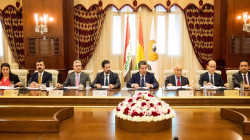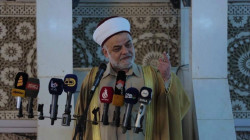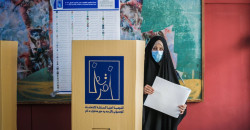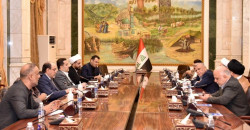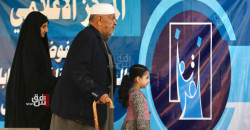Iraq’s outlook: Sunni political figure discusses reform, sectarianism, and regional dynamics
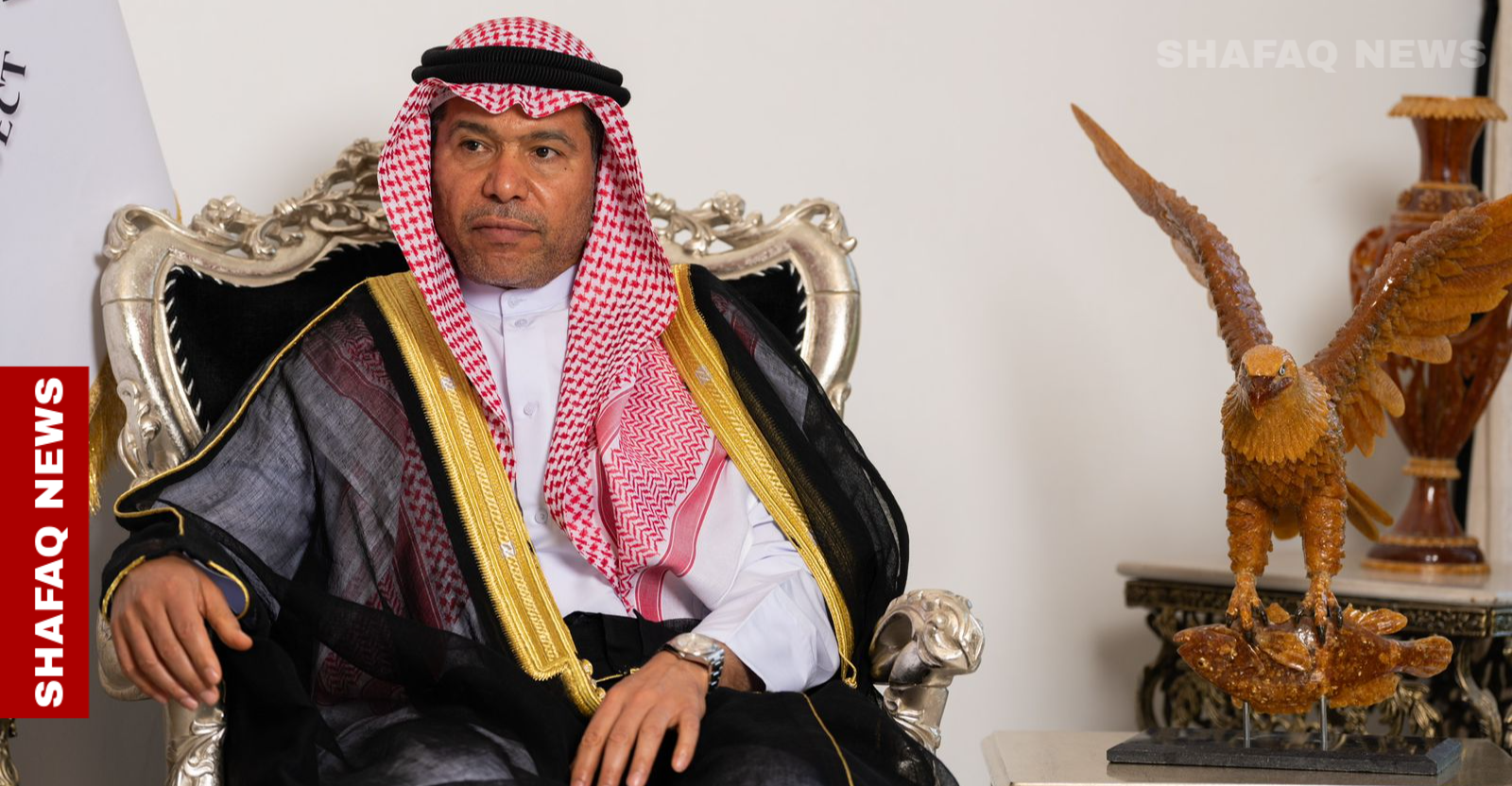
Shafaq News/ In an Iraqi political scene increasingly defined by sectarian alignments and regional dynamics, Jamal Al-Dhari—a tribal Sunni leader with a background spanning military service and civil society activism—has positioned himself as a critic of Iraq’s post-2003 political order while continuing to engage with the formal political process.
Navigating what he calls a “gray zone between power and opposition,” Al-Dhari is pushing a political vision that disavows sectarianism while acknowledging Iraq’s complex post-2003 reality.
In a wide-ranging interview with Shafaq News, Al-Dhari discusses the fading legitimacy of Iraq’s electoral process, the growing regional entanglements, and why he believes reform is impossible without a national dialogue that rewrites the rules of governance.
Born in 1965 in Abu Ghraib and a member of the prominent Zoba’ tribe, Al-Dhari’s life experiences have profoundly shaped his political outlook. He served in the Republican Guard during the Iran-Iraq war, was imprisoned under Saddam Hussein’s regime for opposition activities, and later turned to civil society, founding Ambassadors for Peace in Iraq in Paris.
In 2016, he launched the Iraqi National Project, an initiative, he said, aimed at transcending entrenched ethno-sectarian divides, which remains a cornerstone of his political advocacy.
Elections and the Crisis of Legitimacy
For Al-Dhari, Iraq's electoral history offers little reason for optimism. Looking back over the past decade and a half, he sees a pattern of deep dysfunction and lost legitimacy. “In 2010, there was a setback. In 2014, the elections were marred by unfair circumstances. In 2018, the ballot boxes were burned. And in 2021, we nearly slid into a Shia–Shia war,” Al-Dhari recounts, pointing to what he sees as a consistent failure to uphold democratic principles.
With parliamentary elections scheduled for November 11, 2025, Al-Dhari remains skeptical that meaningful change is on the horizon. “The Sunni lists are well-known, but a new list may emerge to join the electoral race,” he says. “But unless there are guarantees of integrity and real international monitoring, the results will remain within the same circle.”
Al-Dhari argues that the crisis extends beyond flawed elections or the actions of individual political figures, suggesting that the electoral process itself may fail to reflect the true will of the people. “The winner becomes the loser, and the loser is made a winner,” he explains.
One of the most notable developments ahead of the upcoming vote is the continued withdrawal of Muqtada al-Sadr—the influential Shiite cleric and leader of the Sadrist Movement—from the political process. Al-Sadr first stepped back from politics in August 2022 and reaffirmed in March 2025 that he would not participate in the elections. “Let everyone know that as long as corruption exists, I will not participate in a lame electoral process that is solely concerned with sectarian, ethnic, and partisan interests,” Al-Sadr declared.
Al-Dhari welcomed al-Sadr’s decision, interpreting it as a powerful indictment of the political system itself. “From the outset, al-Sadr entered politics later than other Shiite parties and championed reform,” he said. “But after years of experience, he clearly sees reform as nearly impossible under the grip of entrenched corruption and flawed electoral processes. We share his concerns.”
Regarding the potential emergence of new Sunni coalitions, Al-Dhari acknowledges the existing landscape while hinting at the possibility of change. “Real negotiations concerning alliances are set to begin now, especially after the Council of Ministers announced November 11, 2025, as the date for the parliamentary elections. We hope these elections will be conducted with integrity and true monitoring, free from corrupt political money and the influence of government and security forces on voters’ decisions.”
Rejection of Sectarianism and Calls for National Unity
A central theme in Al-Dhari’s political vision is a firm rejection of sectarianism and any attempts to divide Iraq along ethnic or religious lines. “Sectarian regions are unacceptable. Those who think of them are not thinking of Iraq’s interests, but of foreign interests,” he warns. He insists on a unifying national identity, “I’ve said it before and I’ll say it again: Iraq was never Shia or Sunni, and it will remain a country for all Iraqis. There is no place in it for sectarians.”
Al-Dhari also dismisses the recurring topic of the Ba'ath Party's potential return, viewing this narrative as little more than a distraction and a tool of fearmongering. “It’s just a scapegoat. Those who fail in governance create an imaginary enemy named ‘the Ba'ath’ to deflect attention from their own failures,” he explains.
Critique of Sunni Leadership and Sectarian Divisions
Al-Dhari is equally critical of the current state of Sunni political representation. He dismisses the concept of the so-called "Sunni leader," emphasizing that true leadership cannot be bought or given. “Leadership is not something you’re granted or purchased. Today, there is no Sunni leader who has popular consensus. There are party and bloc leaders, but they do not have unanimity,” he asserts, elaborating on his criteria for true leadership, “Leadership requires sacrifices and stances. Anyone who compromises the interests of their own people for the benefit of their party can never be a true leader. I hope we can replace this concept with something more realistic: the political leader.”
On the absence of what is often referred to as the “Sunni house” compared to the Shiite Coordination Framework, Al-Dhari is blunt. “The Shia control the decision-making. As for Sunni meetings, they’re just for taking pictures and exchanging pleasantries. They don’t result in decisions, and they don’t change anything on the ground,” he says, adding, “In the end, the people in the liberated areas* know that these meetings are useless; they neither nourish nor fulfill any real needs.”
The Popular Mobilization Forces: An Ambiguous Role
Al-Dhari expresses a clear and firm stance on the Popular Mobilization Forces (PMF), a powerful paramilitary organization in Iraq. “Any force outside the army and Interior Ministry weakens the state and creates a dangerous duality,” he says.
He calls for greater transparency on the issue of using PMF in the liberated areas as “a tool” to pressure voters in favor of certain political blocs, particularly in light of the ongoing debate about the PMF’s future. “The people have the right to know what is expected of them. The ambiguity cannot continue,” he asserts.
Regional and International Challenges
Al-Dhari also addresses several pressing regional and international challenges facing Iraq. Regarding the strained relationship between the Federal Government and the Kurdistan Region, he believes that the ongoing disagreements stem from a mindset focused on gains rather than genuine partnership. “The solution must be through dialogue, not stubbornness. The citizen is the first to suffer,” he explains.
On the growing tension between the United States and Iran, Al-Dhari sees Iraq as increasingly caught in the middle, serving as a proxy battleground. “We need an independent national decision that prevents Iraq from becoming a platform for settling scores,” he warns.
A Warning from History: Iraq and Syria
In response to comparisons that are sometimes drawn between the Iraqi and Syrian situations, Al-Dhari emphasizes that each country has its own unique circumstances. However, he warns that the indicators in Iraq point to a continued and looming danger. “Iraq is a cornerstone in the region, and its stability is stability for everyone. What happened after 2003—protests, occupation, the rise of ISIS, and the October Revolution—are all signs that the political system has completely failed,” he argues.
Al-Dhari offers his vision for a way out of the crisis, “We need a comprehensive national dialogue conference with the participation of all parties, including unions and civil society. The constitution, written under occupation, must be amended, and we need free and fair elections that prioritize competence and loyalty to the nation, not sectarianism.”
Regarding the Syrian regime, Al-Dhari does not hide his strong stance. “What the Syrian regime has done over 14 years is irrefutable proof of brutality that cannot be justified,” he asserts, pointing out that change in Syria must involve accountability for those responsible, the return of displaced people, and the enforcement of the rule of law.
“We respect the choices of the Syrian people and call for an inclusive transitional government that will restore Syria’s unity and position, which in turn will bring stability to Iraq and the region.”
*Liberated areas in Iraq: refer to regions that were previously under the control of ISIS and were later recaptured by Iraqi forces during military operations. These areas are primarily located in the provinces of Nineveh, Al Anbar, and Saladin.
Jamal Al-Dhari's full text interview with Shafaq:

